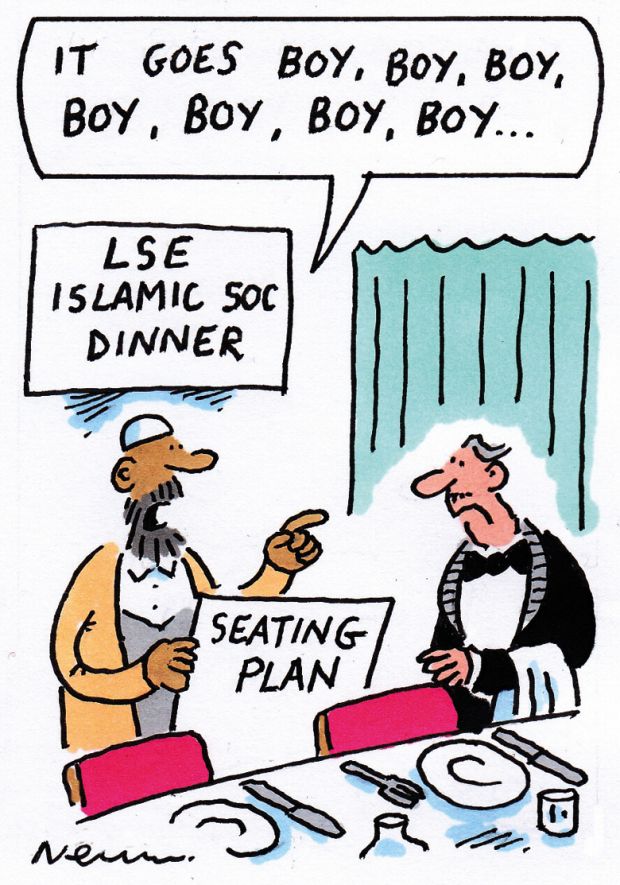
The London School of Economics’ Islamic Society has been criticised for holding a gala dinner at which men and women were segregated, the Daily Mail reported on 15 March. Male and female attendees at the society’s annual dinner at a central London hotel were even discouraged from looking at each other by a screen running down the middle of the tables, the paper added. Tickets for the event were sold separately to “brothers” and “sisters”, the paper said, although LSE students’ union president Nona Buckley-Irvine, who attended, said that she “barely noticed the separation between men and women”. The Mail’s story was placed against a backdrop of alleged rising Muslim fanaticism on campus, including pictures of student-turned-IS executioner Mohammed Emwazi, but it was also adamant that “there is no suggestion that anyone who attended the event…was an extremist”.
A Zionist robot has been accused of harassing students at a forum on the Israeli-Palestinian conflict, the International Business Times reported on 14 March. In an incident described as “dystopian” by some attendees, a “debating cyborg” operated by the pro-Israel group StandWithUs was invited to roam the floor at the event at Brown University, taking part in discussions, the website said. But the contraption – an iPad with wheels that featured an uplink to StandWithUs director Shahar Azani – has been accused of “policing academic discourse” and hassling students about why they were at the event. “Students declined to engage with this bizarre form of intimidation and ignored the robot,” said the Jewish student group Open Hillel. Azani claimed that the presence of his robot alter ego was “completely innocuous” and an attempt to “enrich the conversation”.
Rumours that Prince Harry might study law at Yale University have been swirling round the Ivy League institution, the celebrity gossip site Page Six reported on 14 March. One alumnus speculated that the 31-year-old might use his time there to find a bride, but the unlikely move to the US was dismissed by royal watcher Richard Mineards, who questioned whether the scholarly life would appeal to the fifth in line to the throne. “Harry’s not the brightest bulb in the palace chandelier,” he said, shortly before the official denial of the rather flimsy story arrived from Kensington Palace.
Many more female students are joining raucous drinking clubs similar to Oxford’s Bullingdon Club, The Sunday Times reported on 20 March. Originally set up to help women network, the groups at the universities of Oxford, Cambridge and Bristol have quickly gained a reputation for the kind of riotous behaviour for which the so-called Buller Boys, whose former members include David Cameron and Boris Johnson, are notorious, the paper says. One member of Scortum – an all-women’s group at Bristol – is said to have gambled a £3,000 student loan at a roulette wheel, according to student site The Tab. “From private dining at Mayfair restaurant Sketch to drug-fuelled house parties where members brought celebrity dates…the society is not one for a couple of drinks in the local pub,” the site added, saying its members are “handpicked” on the basis of their looks, wealth and who their families are. Bristol denied any knowledge of Scortum – the Latin word for “whore” – while Oxford said that most students would not have contact with the “small, informal clubs” that had no connection to the university.
Asa Briggs, one of the most prominent university leaders of his generation, has died at the age of 94. Lord Briggs of Lewes was one of the most respected figures of post-war British academic life – a popular and acclaimed historian, champion of adult education and, as vice-chancellor of the University of Sussex, a high-profile figurehead for the 1960s’ “plate-glass universities”. Lord Briggs began academic life early, heading to Sidney Sussex College, Cambridge, at the age of 16. By the age of 20, he had gained a BA and a BSc, before working at Bletchley Park during the Second World War. He later taught at the London School of Economics, the University of Oxford, the University of Leeds and Princeton University before joining Sussex as a pro vice-chancellor in 1961. Lord Briggs, who also served as chancellor of the Open University (1978-94), was described by the current Sussex vice-chancellor, Michael Farthing, as “a visionary and a dear friend” who “contributed to an enormous number of different universities, different ideas to his discipline of history, and on a much wider scale to higher education in general”.
Register to continue
Why register?
- Registration is free and only takes a moment
- Once registered, you can read 3 articles a month
- Sign up for our newsletter
Subscribe
Or subscribe for unlimited access to:
- Unlimited access to news, views, insights & reviews
- Digital editions
- Digital access to THE’s university and college rankings analysis
Already registered or a current subscriber?





